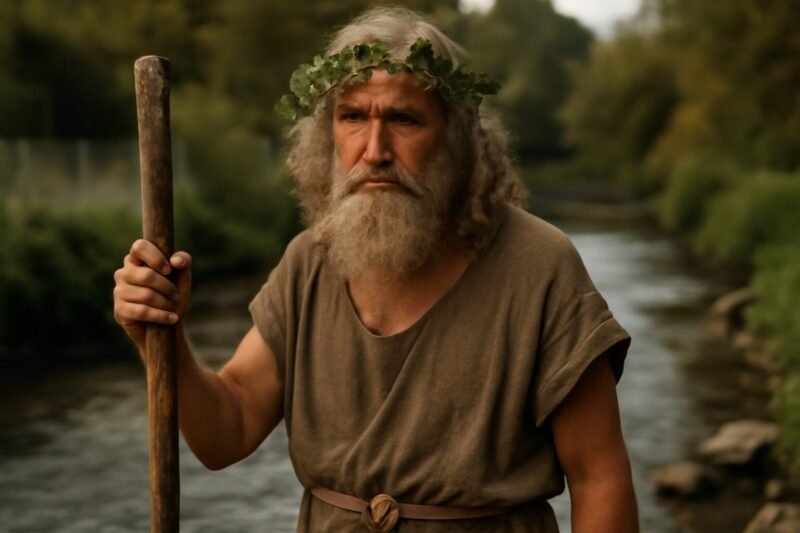Scamander: The Divine River God of Troy
In Greek mythology, Scamander (also known as Xanthos) was the divine personification of the river that flowed near the ancient city of Troy. As both a river god and a key figure in the Iliad, Scamander played a crucial role in the Trojan War, clashing with heroes and gods alike.
Mythology and Role
Scamander was the son of Oceanus and Tethys, two primordial deities of the sea. He was worshiped as a local river god, providing life-giving waters to the Trojan plains. However, his most famous appearance comes in Homer's Iliad, where he becomes enraged when the Greek hero Achilles fills his waters with the corpses of slain Trojans.
In Book 21 of the Iliad, Scamander rises up against Achilles, nearly drowning him in a torrent of water. The river god calls upon his brother river, Simoeis, for aid, and together they threaten to overwhelm the Greek warrior. Only the intervention of Hephaestus, who sends fire to boil Scamander's waters, forces the river god to retreat.
Powers and Significance
As a river deity, Scamander possessed control over his waters—able to summon floods, create whirlpools, and even speak (as depicted in the Iliad). His waters were considered sacred, and according to some myths, they had the power to cleanse or heal. The river itself was vital to Troy's agriculture and survival, making Scamander a protector of the land.
Scamander's battle with Achilles symbolizes nature's wrath against human destruction—a rare moment in Greek mythology where a local deity directly challenges a major hero. His defeat by Hephaestus' fire also represents the Olympian gods' dominance over older, chthonic forces.
Relationships and Worship
Scamander was said to be the father of Teucer, an early king of Troy, linking him to the city's royal lineage. Some versions of myth also associate him with the nymph Idaea, mother of Teucer. The river's importance in Trojan life meant Scamander likely received local worship, though few details of his cult survive.
Interestingly, the name Xanthos ("yellow" or "blonde") refers to the river's golden hue from silt, while Scamander may derive from an older Anatolian name, showing how Greek mythology absorbed local traditions. This dual naming reflects the blending of Greek and Trojan cultural elements in the epic tradition.
Alternative Names for Scamander
God Name: Xanthus (Roman)
Xanthus is the Roman name for Scamander, derived from the Greek word 'xanthos' meaning 'yellow' or 'blonde,' possibly referring to the river's golden hue or sandy banks.
God Name: Skamandros (Greek)
Skamandros is an alternative Greek spelling or variation of Scamander, often used in ancient texts to refer to the river god.
God Name: Simau00efs (Greek (Homeric))
In Homeric tradition, Scamander is sometimes referred to as Simau00efs, another river god associated with the Trojan War, though this may represent a conflation or regional variation.
Tales about Scamander
The River God's Wrath: Scamander and Achilles
During the Trojan War, the river god Scamander watched as the Greek hero Achilles stained his waters with Trojan blood. Enraged by the pollution and disrespect, Scamander rose from his banks in a torrential fury, his currents swelling to drag the warrior under. Achilles, though mighty, struggled against the divine force, crying out to the gods for aid.
Divine Intervention
Hearing his plea, Hephaestus, the god of fire and forge, answered. With a command, he unleashed scorching flames upon Scamander’s waters, boiling the river until it steamed and receded. Defeated and scorched, Scamander conceded, promising peace in exchange for an end to the fiery assault. This clash underscored the raw power of nature deities and the limits even heroes faced against them.
Scamander’s Healing Pact with Asclepius
In a time of plague, the river god Scamander observed the suffering of mortals along his banks. Moved by their plight, he sought the aid of Asclepius, the god of healing. Together, they devised a remedy: Scamander’s pure waters would carry herbs blessed by Asclepius, curing the ill who drank from his flow.
A Legacy of Renewal
This collaboration brought prosperity to the region, with Scamander’s river becoming a symbol of rejuvenation. Temples to Asclepius soon dotted its shores, and pilgrims flocked to bathe in its restorative currents. The alliance between the river and the healer highlighted the harmony possible between nature and divine art, leaving a legacy of health and hope.
Frequently Asked Questions
Who is Scamander in Greek mythology?
Scamander is a river god in Greek mythology, associated with the river now known as the Karamenderes in Turkey. He is considered one of the rustic deities, often depicted as a powerful and sometimes vengeful god connected to nature and water.
Why is Scamander important in Greek myths?
Scamander is important because he plays a role in the Trojan War, where he battles the hero Achilles after the warrior pollutes his waters with the bodies of slain enemies. This highlights the Greeks' reverence for nature and the belief that even gods could be tied to specific locations.
What are rustic deities in Greek mythology?
Rustic deities in Greek mythology are minor gods and spirits associated with nature, such as rivers, forests, and mountains. They represent the untamed aspects of the natural world and were often worshiped locally by rural communities.
What can we learn from the story of Scamander?
The story of Scamander teaches us about the ancient Greek belief in the sacredness of nature and the consequences of disrespecting it. It also reflects the idea that even lesser-known gods had significant power and influence in their domains.
How does the concept of rustic deities apply today?
While not worshiped today, rustic deities like Scamander remind us of humanity's historical connection to nature and the importance of respecting the environment. They also show how ancient cultures personified natural forces to explain and interact with the world around them.













